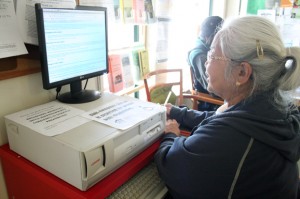 During my time in MPNH’s computer classes, I have been trying to understand what purpose learning basic computer skills serves for the immigrant women who participate. After spending five weeks with the women in both classes, I have seen that motivations for learning computer skills vary. Many participants want to be able to communicate with friends and family living outside Vancouver, some feel they need to ‘keep up’ as the world becomes increasingly dependent on ICTs (Information and Communication Technologies), and others want access to information online such as job postings, world news, or bus schedules. However, I was unclear as to how these women’s individual motivations to gain skills and subsequent uses of computers connected to the theoretical issues of immigration that we had been discussing in class.
During my time in MPNH’s computer classes, I have been trying to understand what purpose learning basic computer skills serves for the immigrant women who participate. After spending five weeks with the women in both classes, I have seen that motivations for learning computer skills vary. Many participants want to be able to communicate with friends and family living outside Vancouver, some feel they need to ‘keep up’ as the world becomes increasingly dependent on ICTs (Information and Communication Technologies), and others want access to information online such as job postings, world news, or bus schedules. However, I was unclear as to how these women’s individual motivations to gain skills and subsequent uses of computers connected to the theoretical issues of immigration that we had been discussing in class.
I found the connection I was looking for in our reading of Arjun Appadurai who suggests that cyberspace often serves as a “means of providing a sense of aspiration and hope to…migrant populations” (Pyati & Srinivasan, 2007, p 1734). This statement holds relevance for my observation and conversations with A, an older South Asian woman who attended computer classes. A told me that she gets depressed and stressed out, and that she was in the class because her doctor suggested that she try something new (presumably to help with her depression). A said she was glad that she made an effort to come to class, even though it was hard for her and some days she didn’t want to. She now feels more confident using computers, and particularly proud of her new ability to use email. A added that she was excited to email her son a copy of her Power Point presentation that she had done as her final class project. Thus for A, learning to communicate with others online provided her with a sense of confidence in her abilities to learn new things and helped alleviate some of her anxiety and negative feelings (at least temporarily).
Not only do online ‘worlds’ provide a space of hope and aspiration for immigrants, according to Appadurai, “[all] electronic media provide resources for self-imagining as an everyday social project” (1996, p 4). I witnessed a form of this ‘self-imagining’ in another participant’s presentation of her Power Point project. In her slideshow, P showed pictures that she had found online of what she called ‘the house of my dreams.’ P explained how she wants to have a fancy house with big windows that look onto a lush garden. A particular image showed a smiling family in formal attire standing on the front steps of a grand house, with the mother wearing a white ball gown. P said she imagines this is her family in front of their house. When each of her daughters turn fifteen, she dreams of them wearing beautiful dresses like the one in the photo for their quinceaneras (a Mexican coming of age ceremony for girls). P further described how she wanted to have big fancy parties for each quinceanera, and how her girls would look like princesses and how happy that would make her.
As a recent immigrant from Mexico, with little English skills and 4 young children to care for on her partner’s low-income, P’s life in Canada has been challenging. Through her use of Power Point and web-sourced images P played with ideas that were at once fantasies but also real, powerful imaginings for her future. She used computer media to articulate her desires for financial security, the wellbeing of her family, and for a better life than the one she left behind in Mexico.

